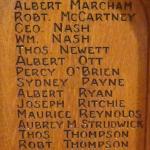BX June 22, 1917
Brant Soldier Tells of Air Raid Over Folkstone – Pte. T. Newitt, Late of 215th Was on Way There When Raid Occurred – Distressing Sights
May 27, 1917
Witley Camp
We have just arrived here safely. A draft of the 215th, 204th and 164th Battalions left East Sandling station at 9.15 this morning and we arrived at Milford station at 1 o’clock. Then we had to march about three miles to camp. We now belong to the 125th Battalion, not the 215th, and will act as reinforcements to them at the front later on. This is a much bigger camp than Sandling, but the surrounding country does not look so nice as it does around Sandling. That is the best scenery I have seen for a long time. I went to Folkestone on Thursday with some chums. It was only one shilling return fare. I sent you a number of views and some more silk cards. I mailed them from Hythe. On Friday we had the very exciting experience of the first actual scene of war. Two other fellows and I were just started for Hythe about 5.30 in the evening when we heard a humming noise in the air which kept getting louder. By the time we reached Hythe it was right over us and we managed to count 16 German Taube flying machines up a very great height. It was a job to see them; they were almost the same color as the sky. The sun was shining so brightly we could see they were in battle formation, when all of a sudden the first bomb dropped on the shore without it bursting. The next minute one dropped in the old churchyard, not 500 yards from where we were standing on a hill. It exploded, with terrific force, tearing a big hold in the ground and smashing several grave stones to pieces. A piece of shrapnel from the bomb struck the old verger, who was standing outside the church on the thigh, cutting an artery. He bled terribly before they took him to the hospital. A small bit of shrapnel dropped about 10 yards from us, which I picked up and am enclosing. Another bomb killed a woman in town, but I did not see her. The machines flew over Folkestone and we could see the bombs exploding in the distance, so we jumped on the bus. We were in Folkestone in 20 minutes. The machines by this time had flown right over the Channel towards Dunkirk, and were fighting with our flying machines. I believe we fetched down three.
The sight in Folkestone I can hardly describe. Houses and stores were smashed all to pieces, roofs blown off, great holes torn in the streets, and dead and dying everywhere in the town district – mostly women and children. I helped carry three out of a store, and altogether I counted 22 dead and 53 injured, but they say there was a lot more than that killed and injured. Some were buried under the ruins, and it would take two or three days to get at them. Several horses were also killed. I saw one torn all to pieces, the rig smashed, and a man and woman who were in it killed. It was a sickening sight. One bomb dropped at the back of our camp, but did not explode. Some small damage was done at Otterpool and several other places. This was the biggest air raid that had ever taken place in England.
I have not had my leave yet. The first bunch came back Saturday night from their leave, so we left them all at East Sandling. I don’t know if they will come here or not. We have been issued with gas masks and steel helmets; also our identification tags with our name, number, and 125th Battalion on them. We get another medical examination tomorrow. I think it will be a strict one with Dr. Hanna.
Pte. T. Newitt, 270018
C.E.F. Army P.O.,
London, England

